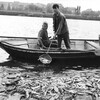'The Rhine as One River'
Rhine Pollution and Multilevel Governance, 1950s to 1970s
DOI:
https://doi.org/10.51769/bmgn-lchr.11694Abstract
Asked why and how cross-border environmental governance developed in Western Europe, the 1970s are generally considered a key decade. By taking the historical evolution of the international Rhine regime as a lens, we will argue that the post-war decades need to be taken into account to understand the major changes that took place from the 1970s onwards. In this article, we examine the large variety of state and non-state actors that became involved in the contestation around the issue of Rhine pollution from the 1950s until the late 1970s. Looking at how problem definitions and strategies changed over time, we answer the question whether enough common ground could be found among water supply companies, horticulturalists and environmental activists to build a coalition against polluting industries, and how the dynamics of their interaction may be described.
De jaren zeventig worden gezien als cruciale periode voor de ontwikkeling van grensoverschrijdend milieubeleid in West-Europa. Dit artikel over de historische ontwikkeling van het internationale Rijnregime toont aan dat een studie van de directe naoorlogse decennia van belang is om de grote veranderingen vanaf de jaren 1970 volledig te begrijpen. In onze bijdrage analyseren we een groot aantal statelijke en niet-statelijke actoren die betrokken waren in de politieke strijd tegen de vervuiling van de Rijn vanaf de jaren vijftig tot en met de jaren zeventig. Met een onderzoek naar veranderende probleemdefinities en strategieën doorheen de tijd gaan wij na of drinkwaterbedrijven, tuinbouwers en milieuactivisten voldoende met elkaar gemeen hadden om een coalitie tegen vervuilende industrieën te voeren en hoe de dynamiek van hun interactie beschreven kan worden.
Downloads

Published
Issue
Section
License
Copyright (c) 2022 Liesbeth van de Grift

This work is licensed under a Creative Commons Attribution 4.0 International License.
Authors who publish with this journal agree to the following terms:
a) Authors retain copyright and grant the journal right of first publication with the work simultaneously licensed under a Creative Commons Attribution 4.0 International (CC BY 4.0) that allows others to share the work with an acknowledgement of the work's authorship and initial publication in this journal.
b) Authors are able to enter into separate, additional contractual arrangements for the non-exclusive distribution of the journal's published version of the work (e.g., post it to an institutional repository or publish it in a book), with an acknowledgement of its initial publication in this journal.
c) Authors are permitted to post their work online (e.g., in institutional repositories or on their website) prior to and during the submission process.
Authors are explicitly encouraged to deposit their published article in their institutional repository.











